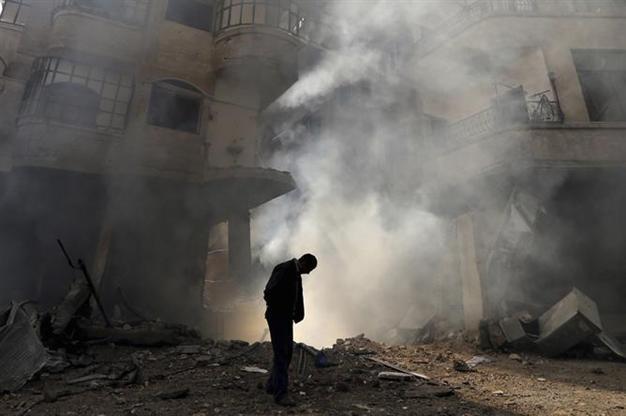Rebel win could spread war: Iraq
BAGHDAD - Reuters

A man walks in front of a burning building after a Syrian Air force air strike in Ain Tarma neighbourhood of Damascus in this January 27, 2013 file photo. REUTERS/Goran Tomasevic
Turkish and Qatari support for Syrian insurgents is tantamount to a declaration of war against Iraq, which will suffer from the fallout of an increasingly sectarian conflict next door, an Iraqi Shi'ite politician said.Hadi al-Amiri, transport minister and head of the formerly armed Badr Organisation, said Sunni Muslim Turkey and Qatar had stymied all efforts to resolve the Syrian conflict peacefully.
Iraq is calmer than in the communal bloodletting that killed tens of thousands in 2006-2007, but the war in neighbouring Syria is straining its precarious sectarian balance.
Amiri accused Ankara and Doha, which support the opposition to Syrian President Bashar al-Assad, of arming jihadi groups in Syria, where many Sunni militants are fighting, including the Qaeda-approved Nusra Front, which has links to al Qaeda in Iraq.
"Presenting money and weapons to al Qaeda (in Syria) by Qatar and Turkey is a declaration of armed action against Iraq," Amiri told Reuters in an interview this week. "These weapons will reach Iraqi chests for sure."
Sectarian-tinged unrest has been on the rise in Iraq. Tens of thousands of Iraqi Sunnis have staged protests against Prime Minister Nuri al-Maliki's Shi'ite-led government in their western stronghold of Anbar bordering Syria, and al Qaeda has urged them to take up arms.
Al Qaeda-linked militants appear to be regrouping in Anbar's caves and valleys, with some moving into Syria to join the fight against Assad, whose Alawite sect springs from Shi'ite Islam.
Scores of Iraqi Shi'ite militants are also fighting in Syria alongside forces loyal to Assad, who is backed by Shi'ite Iran.
Amiri, whose Badr Organisation laid down its weapons in 2004, said he was against militias, criticising the recent formation of a new Shi'ite militia named al-Mukhtar Army.
Some people in Baghdad's southwestern district of Jihad have received death threat leaflets signed by al-Mukhtar Army telling them to leave the mixed Sunni-Shi'ite neighborhood.
"Using militias again is a big mistake," Amiri said. "If we (Shi'ites) form militia and they (Sunnis) form militia, then Iraq will be lost."
Kurdish-Shi'ite alliance
Turning to the Baghdad government's dispute with autonomous Kurds over land and oil rights in the north, Amiri said this should not undermine traditional ties between Shi'ites and Kurds who were both oppressed under former strongman Saddam Hussein.
"This has nothing to do with this deep strategic alliance. Technical problems have to be fixed based on the constitution and the oil and gas law," he declared.
Baghdad says it alone has the authority to control Iraqi oil exports, while the Kurds say their right to export from their autonomous northern region is enshrined in Iraq's federal constitution, drawn up after the U.S.-led invasion of 2003.
New legislation to govern the world's fourth largest oil reserves has been caught up for years in a struggle over how to share power between Iraq's Sunni, Shi'ite and Kurdish factions, which has intensified since U.S. troops withdrew a year ago.
"Frankly, we are in the federal government and the prime minister is serious about this issue," Amiri said. "He won't make a concession ... he is a stubborn and won't bargain".
















